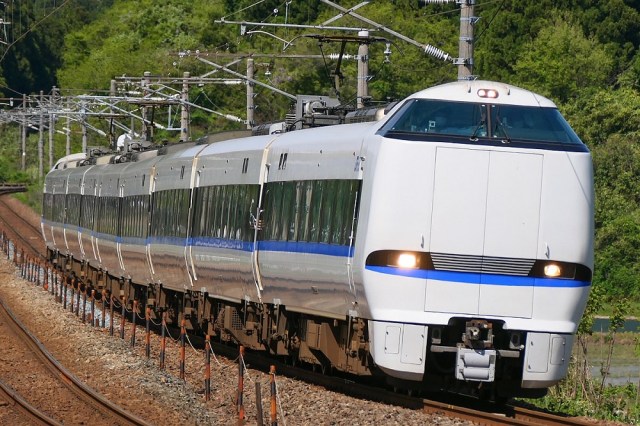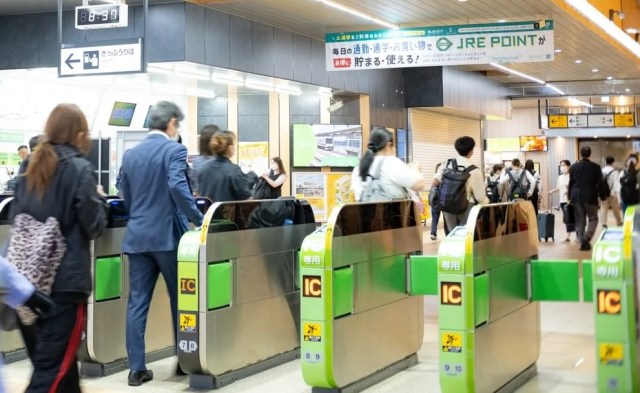
Tokkyuken check leads to altercation and delay.
When trains go out of service in Japan, they go out in style. Rail operators put together “last run” celebrations, drawing in not just hard-core train otaku but also more mainstream travelers who have fond memories of riding that particular train to destinations along its route over the years. The memories for one group of last-run passengers, though are probably going to be less pleasant, due to an altercation between one rider and the train staff.
Recently, West Japan Railway and its passengers were preparing to bid a bittersweet goodbye to the full service of the Thunderbird special express (pictured above). First going into service in 1995, the Thunderbird was the successor to the Raicho (also meaning “thunderbird”) express that began in 1964, connecting Osaka with the Hokuriku region along the northern shore of Japan’s main island of Honshu.
The Thunderbird ran from Osaka to Kanazawa, in Ishikawa Prefecture. As of this month, though, the two cities are linked through the extension to the Hokuriku Shinkansen line. With the faster, more modern bullet train becoming an option, JR West made the decision to truncate the Thunderbird’s route, eliminating all stops north of Tsuruga Station in Fukui Prefecture, meaning that the Thunderbird will no longer reach to Ishikawa at all.
▼ The Thunderbird pulls out of the station on its last run
The last day for the full-length Thunderbird run was March 15, but even the day before, fans were showing up for one last ride. On one run on the 14th, however, passengers were startled to hear the train’s P.A. system come to life, and a staff member inform them that “The police are investigating an incident that has occurred onboard,” and that the train would be making an extended stop at Tsuruga Station.
So what sort of incident had occurred? According to JR West, in one of the cars a foreign passenger was asleep in one of the seats, and when the conductors came by they asked to see his ticket. Specifically, they wanted to see his tokkyuken, or “special express ticket.” The passenger, a Caucasian male, didn’t have one, though, and instead became agitated and shoved the conductor. Following the ruckus, the train made a 40-minute stop at Tsuruga Station, where more police were waiting.
▼ Stills showing the police response can be seen at the point in the video here.
This wasn’t necessarily a case of a foreign passenger being singled out for stricter ticket checks. When traveling by special express trains in Japan, passengers must pay for two types of ticket. One covers the base fare from their starting station to their destination, and costs the bare minimum for that route, the fare that one would use for any and all trains to travel between those points. The second ticket, the tokkyuken, covers the additional surcharge required to ride faster long-distance express trains, such as the Thunderbird or Shinkansen.
For trains that don’t require a tokkyuken, there’s no need to check passengers’ tickets onboard, since they’ll be checked, either by staff or automated ticket gates, when they leave the station. However, at many stations, passengers getting off both standard-price trains and additional-cost ones are funneled into the same area. While the Shinkansen always has its own gates, other tokkyuken trains often don’t, and so tickets are checked onboard, to prevent someone from buying the base ticket only, riding the special express for free, and then waltzing out of the station after they get off without paying for the tokkyuken.
Now, there are two possible explanations for how the passenger ended up on the Thunderbird without a tokkyuken. The first is that he simply didn’t know he needed one. Granted, that shows a pretty poor level of research into traveling in Japan, but there’s a chance it was an honest mistake, and that he was confused and panicked when the conductors demanded he show them tickets that he didn’t have or even think he needed.
However, even if that was the case, panicking is an improper response, and shoving a conductor is an idiotic one. Though Japan is not an entirely crime-free country, you can rest assured that its rail operators run a tight enough ship that there’s zero chance of the staff trying to shake you down for money or otherwise scam you onboard. Should you ever find yourself on a train in Japan and a staff worker is telling you that you need another ticket, you can rest assured that they’re telling you the truth. If that happens, stay calm. Even if you can’t purchase the ticket right then and there from the conductor, they’re not going to throw you out the window while the train is still moving. At the very worst, they’ll ask you to get off at the next station and settle the bill before reboarding another train.
Of course, there’s also the possibility that the man knew he needed a tokkyuken, but thought that he could sneak onto and off the train before anyone found out he didn’t have one. This is dumb, inconsiderate, and unethical for a whole bunch of reasons, and makes shoving the conductor even dumber, since it’s not like there’s anywhere he could have then escaped to since, you know, this was all happening inside a moving train.
It’s unclear what charges, if any, the man faces as a result of his actions, but it’s unfortunate that rail fans who were looking forward to one last ride on the Thunderbird had to put up with such a dumb disturbance.
Source: TV Asahi via Livedoor News via Jin, J-Cast News
Top image: Wikipedia/MaedaAkihiko
Insert images: Pakutaso
● Want to hear about SoraNews24’s latest articles as soon as they’re published? Follow us on Facebook and Twitter!


 New JR Shinkansen-inclusive rail pass is a huge bargain, great way to help out a region in need
New JR Shinkansen-inclusive rail pass is a huge bargain, great way to help out a region in need Osaka earthquake hits city during peak hour, passengers freed after trains suspended
Osaka earthquake hits city during peak hour, passengers freed after trains suspended Japanese train conductor flips off rail fan photographer, prompts apology from JR
Japanese train conductor flips off rail fan photographer, prompts apology from JR Drunken salaryman’s solution to barely missing the last train: Ride on the outside of it
Drunken salaryman’s solution to barely missing the last train: Ride on the outside of it Japanese train company issues official apology for “inexcusable” 25-second early departure
Japanese train company issues official apology for “inexcusable” 25-second early departure Japan’s new difficult-to-drink-from beer glass protects your liver, but it’s a brutal experience
Japan’s new difficult-to-drink-from beer glass protects your liver, but it’s a brutal experience Hello, cosmetics! Clinique teams up with Hello Kitty this summer for first-time collaboration
Hello, cosmetics! Clinique teams up with Hello Kitty this summer for first-time collaboration How to order snacks on a Shinkansen bullet train in Japan
How to order snacks on a Shinkansen bullet train in Japan Demon Slayer: Kimetsu no Yaiba gets new roller coaster attractions and food at Universal Studios Japan
Demon Slayer: Kimetsu no Yaiba gets new roller coaster attractions and food at Universal Studios Japan New samurai glasses are Japan’s latest weird must-have souvenir
New samurai glasses are Japan’s latest weird must-have souvenir Burger King Japan suddenly adds Dr. Pepper and Dr. Pepper floats to its menu nationwide
Burger King Japan suddenly adds Dr. Pepper and Dr. Pepper floats to its menu nationwide New Nintendo Lego kit is a beautiful piece of moving pixel art of Mario and Yoshi【Photos】
New Nintendo Lego kit is a beautiful piece of moving pixel art of Mario and Yoshi【Photos】 What do you eat when you catch a cold? We asked 11 of our Japanese reporters
What do you eat when you catch a cold? We asked 11 of our Japanese reporters High-fashion Totoro cuddle purse is like an elegant stroll in the forest【Photos】
High-fashion Totoro cuddle purse is like an elegant stroll in the forest【Photos】 Why Japanese doesn’t need swear words
Why Japanese doesn’t need swear words Nintendo history you can feel – Super NES, N64, and GameCube controllers become capsule toys
Nintendo history you can feel – Super NES, N64, and GameCube controllers become capsule toys “The most Delicious Cup Noodle in history” – Japan’s French Cup Noodle wins our heart【Taste test】
“The most Delicious Cup Noodle in history” – Japan’s French Cup Noodle wins our heart【Taste test】 Starbucks releases a cute Frappuccino and Unicorn Cake…but not in Japan
Starbucks releases a cute Frappuccino and Unicorn Cake…but not in Japan Kyoto Tower mascot termination reveals dark side behind cute Japanese characters
Kyoto Tower mascot termination reveals dark side behind cute Japanese characters McDonald’s Japan’s Soft Twist Tower: A phantom ice cream only sold at select branches
McDonald’s Japan’s Soft Twist Tower: A phantom ice cream only sold at select branches Yabai Ramen: What makes this Japanese ramen so dangerous?
Yabai Ramen: What makes this Japanese ramen so dangerous? Finally! Nintendo Japan expands Switch 8-bit controller sales to everybody, Online member or not
Finally! Nintendo Japan expands Switch 8-bit controller sales to everybody, Online member or not Japanese government wants to build luxury resorts in all national parks for foreign tourists
Japanese government wants to build luxury resorts in all national parks for foreign tourists To combat declining birth rate, Japan to begin offering “Breeding Visas” to foreigners
To combat declining birth rate, Japan to begin offering “Breeding Visas” to foreigners 10 things you should buy at 7-Eleven in Japan
10 things you should buy at 7-Eleven in Japan Studio Ghibli releases anime heroine cosplay dresses that are super comfy to wear
Studio Ghibli releases anime heroine cosplay dresses that are super comfy to wear Woman charged for driving suitcase without a license in Osaka
Woman charged for driving suitcase without a license in Osaka Studio Ghibli unveils My Neighbour Totoro miniature house model
Studio Ghibli unveils My Neighbour Totoro miniature house model Kyoto experiencing problems with foreign tourists not paying for bus fares, but not on purpose
Kyoto experiencing problems with foreign tourists not paying for bus fares, but not on purpose Fighting mild hunger with a Japanese soda that turns into jelly in the stomach【Taste test】
Fighting mild hunger with a Japanese soda that turns into jelly in the stomach【Taste test】 Studio Ghibli’s Howl’s Moving Castle tapestry unveiled in Japan for first time
Studio Ghibli’s Howl’s Moving Castle tapestry unveiled in Japan for first time McDonald’s new Happy Meals offer up cute and practical Sanrio lifestyle goods
McDonald’s new Happy Meals offer up cute and practical Sanrio lifestyle goods Sales of Japan’s most convenient train ticket/shopping payment cards suspended indefinitely
Sales of Japan’s most convenient train ticket/shopping payment cards suspended indefinitely Sold-out Studio Ghibli desktop humidifiers are back so Totoro can help you through the dry season
Sold-out Studio Ghibli desktop humidifiers are back so Totoro can help you through the dry season Japanese government to make first change to romanization spelling rules since the 1950s
Japanese government to make first change to romanization spelling rules since the 1950s Foreigner’s request for help in Tokyo makes us sad for the state of society
Foreigner’s request for help in Tokyo makes us sad for the state of society Ghibli founders Toshio Suzuki and Hayao Miyazaki contribute to Japanese whisky Totoro label design
Ghibli founders Toshio Suzuki and Hayao Miyazaki contribute to Japanese whisky Totoro label design Doraemon found buried at sea as scene from 1993 anime becomes real life【Photos】
Doraemon found buried at sea as scene from 1993 anime becomes real life【Photos】 Tokyo’s most famous Starbucks is closed
Tokyo’s most famous Starbucks is closed Princesses, fruits, and blacksmiths: Study reveals the 30 most unusual family names in Japan
Princesses, fruits, and blacksmiths: Study reveals the 30 most unusual family names in Japan Man dressed as Batman’s Joker commits stabbing/arson attack on Tokyo train on Halloween night
Man dressed as Batman’s Joker commits stabbing/arson attack on Tokyo train on Halloween night Beautiful new luxury train for Ishikawa dazzles with gold leaf and lacquer interior
Beautiful new luxury train for Ishikawa dazzles with gold leaf and lacquer interior Shinkansen will require reservations for large suitcases, charge penalty fees for those without
Shinkansen will require reservations for large suitcases, charge penalty fees for those without New Japan rail pass gives you a week of free rides in a huge space to chase the cherry blossoms
New Japan rail pass gives you a week of free rides in a huge space to chase the cherry blossoms Shinkansen conductor caught playing GPS smartphone game on bullet train…for TEN years
Shinkansen conductor caught playing GPS smartphone game on bullet train…for TEN years We channel Sen from Ghibli’s Spirited Away and travel to a Japanese train station by the sea
We channel Sen from Ghibli’s Spirited Away and travel to a Japanese train station by the sea Woman kills self jumping onto train tracks, delay causes conductor to jump off tracks at other station
Woman kills self jumping onto train tracks, delay causes conductor to jump off tracks at other station JR East to equip trains station staff with bodycams to protect them from attacks
JR East to equip trains station staff with bodycams to protect them from attacks Japan Railway to allow dogs to ride without cages on special Tokyo-Izu train
Japan Railway to allow dogs to ride without cages on special Tokyo-Izu train Japan’s Moonlight Nagara train service ends, leaving a hole in overnight rail travel
Japan’s Moonlight Nagara train service ends, leaving a hole in overnight rail travel Nozomi Shinkansen bullet train abolishes low-priced unreserved tickets during peak travel seasons
Nozomi Shinkansen bullet train abolishes low-priced unreserved tickets during peak travel seasons Saitama man arrested for making 9,313 false reservations on luxury trains
Saitama man arrested for making 9,313 false reservations on luxury trains Japanese train conductor surprises everyone on board with his English skills
Japanese train conductor surprises everyone on board with his English skills Japan’s high-speed Shinkansen train makes emergency stop as snake is found onboard
Japan’s high-speed Shinkansen train makes emergency stop as snake is found onboard Potentially dirty and broken used Shinkansen food/beverage carts on sale in Japan for 100,000 yen
Potentially dirty and broken used Shinkansen food/beverage carts on sale in Japan for 100,000 yen
Leave a Reply